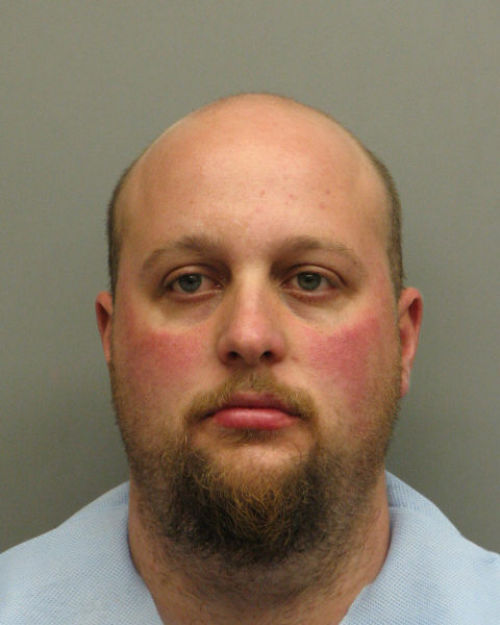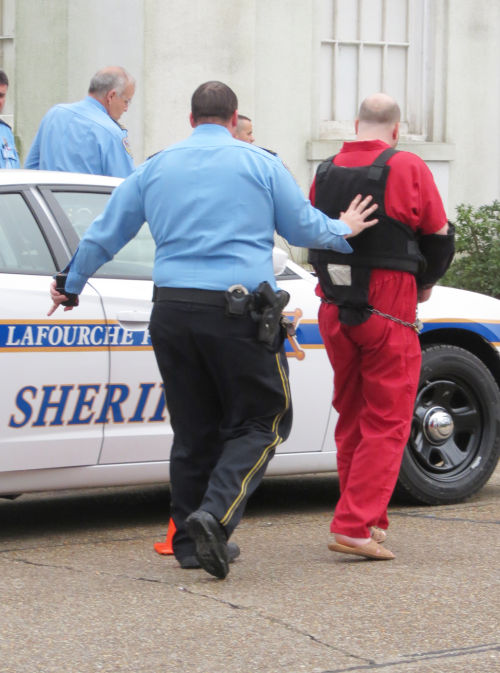
Motorcycle Specialties a one-stop for biking needs
February 5, 2013
Timeline: Jeremiah Wright
February 5, 2013Jeremiah Wright demonstrated he understands the severity of the first-degree murder charged levied against him when he told an examiner he would prefer to be executed via the guillotine rather than lethal injection, that examiner testified Friday.
Manfred Greiffenstein, the state’s third witness called in Wright’s competency hearing that has now eclipsed four days, told the court he believes Wright has a factual and rational understanding of the court system and how it applies to him.
That Wright “contemplated a painless death tells me he takes the charge seriously,” said Greiffenstein, who examined Wright for roughly four hours at the Lafourche Parish Detention Center last November. Wright understands the guillotine is not a realistic option – lethal injection would be the course of execution – but he expressed that it would be his “preferred method,” Greiffenstein said.
Wright confessed to investigators that he decapitated and dismembered his 7-year-old special-needs son Jori Lirette at their Thibodaux home in August 2011. He was indicted on a first-degree murder charge and could face capital punishment if found guilty.
District Judge John LeBlanc stalled criminal proceedings when he ruled based on a sanity commission’s findings that Wright was not competent to stand trial.
Wright was transferred to the Eastern Louisiana Mental Health System, under the Department of Health and Hospital’s purview, where doctors where tasked with restoring his competency to stand trial. ELMHS discharged Wright last July and declared him mentally fit to proceed.
The degree to which Wright understands his legal predicament and the options afforded to him as a defendant in a capital murder case has been perhaps the key debate waged in a Thibodaux courtroom the first four days of Wright’s competency hearing.
Doctors at a state-run hospital tasked with rehabilitating Wright to stand trial utilized a checklist of general legal procedure questions – referred to as the Bennett criteria as derived from a 1977 state Supreme Court ruling – to gauge his competency.
The checklist prompted Wright to respond on things such as the distinction between first- and second-degree murder, various pleas and their meanings, rules of the courtroom, ability to protect himself and his rights, his available defenses and potential verdicts and their penalties.
The hospital’s doctors said Wright met all of the criteria, but doctors reporting to the defense counsel have questioned whether he can rationally apply the factual knowledge to his situation, which is blurred by a delusion.
The defense has also questioned whether Wright has the “executive function” to make decisions regarding his best interests.
Juan Smith, a licensed social worker with DHH, has visited Wright 40 times since the suspect was returned to the Lafourche Parish Detention Center. His task was to gauge whether Wright’s mental health had deteriorated and evaluate and help maintain Wright’s competency level.
Smith testified Friday that he reviewed the Bennett criteria with Wright on each visit and agreed with defense counselor Cecelia Bonin that he basically asked Wright the same questions each time, which Bonin insinuated allowed Wright to reach a level of comfort with the queries.
Regarding a question about a potential plea bargain, Smith said, “sometimes that’s not very easy for him to explain.” Smith said he didn’t specifically measure Wright’s grasp on the complexity of the case and that he didn’t pose in-depth legal questions to the suspect because it’s not his job to issue a diagnosis.
Smith testified there was no deterioration in Wright’s mental health. He visited with Wright for 15 to 45 minutes each time – sometimes separated by the door to Wright’s single-man jail cell – and reported that Wright denied hallucinations.
It was sometimes “uncomfortable” to converse with Wright, Smith said. “I’m trying to build a rapport with him, and he’s not reciprocating,” the social worker testified.
Witnesses who examined Wright and testified on behalf of the defense have said he has a factual but not rational understanding of courtroom procedures and how they apply to him.
Examiners for the state and the defense project have agreed that delusions may have driven his rationality for killing the boy – Wright said he thought he was part of a government-sponsored social experiment and that he believes Jori was an inanimate object. But they differ on whether or not the misguided beliefs would prevent him from providing a competent defense in a trial setting; prosecutors say they do not, but the defense team says they do because he believes he’ll be discharged without punishment regardless of how the trial plays out.
Wright believes he will not be punished for the crime because it was an experiment and he has fluctuated on Jori’s cause of death, lacks the ability to defend himself from the witness stand should he be called and cannot make strategic rational decisions alongside his counsel, they have argued. Defense experts have also said they believe Wright suffers from a psychotic disorder, which contradicts ELMHS’ final report and other state witnesses.
Wright deviated from that delusion at least one time, according to testimony of a doctor at ELMHS. He referred to his “son” as real, said he allowed him to watch television with nudity and said that the “blood and guts” he uncovered when dismembering the boy made it clear Jori was a real person, the doctor testified.
But Greiffenstein said that delusion doesn’t disqualify competency. He termed it as “monothematic” and said his personal examination of Wright revealed the suspect understands dynamic interaction between a courtroom’s cast, has a sound memory and can defend himself when challenged and engaged.
“His disengagement masks a quick and active mind,” Greiffenstein said.
The report’s second author is expected to testify Saturday, and closing arguments are tentatively scheduled. LeBlanc said at the conclusion of Friday’s session that he may issue a ruling Saturday.
Jeremiah Wright is escorted to his competency hearing by Lafourche Parish Sheriff’s Deputies. Wright is accused of the first-degree murder of Jori Lirette, his 7-year-old disabled son.












